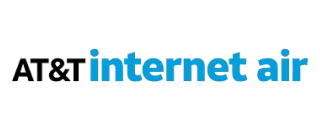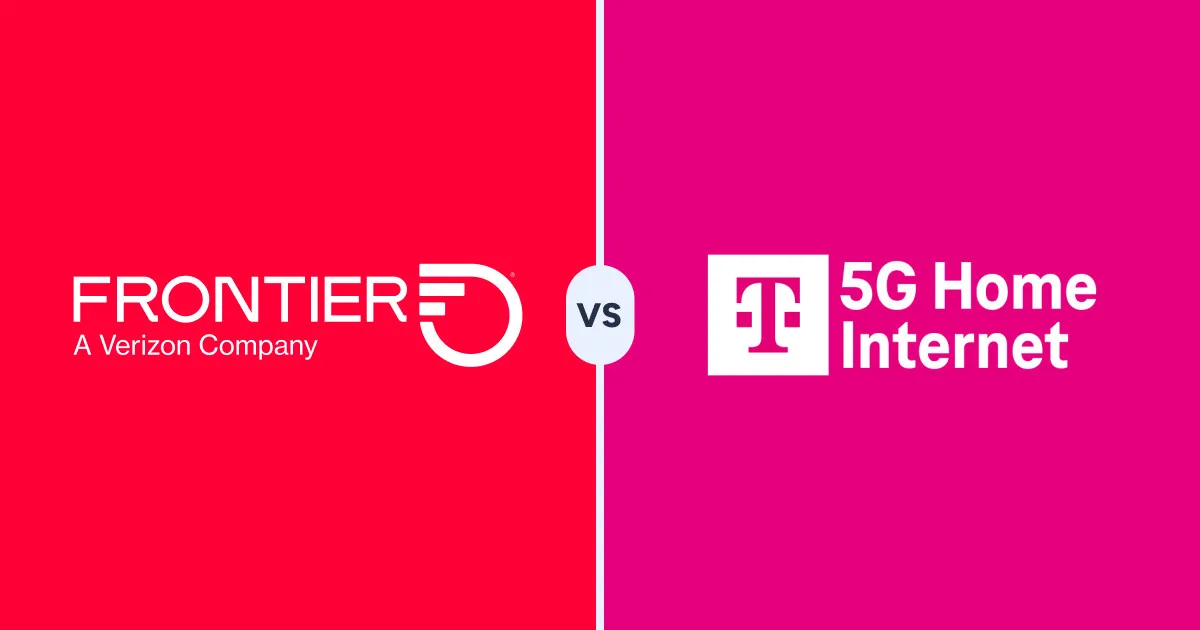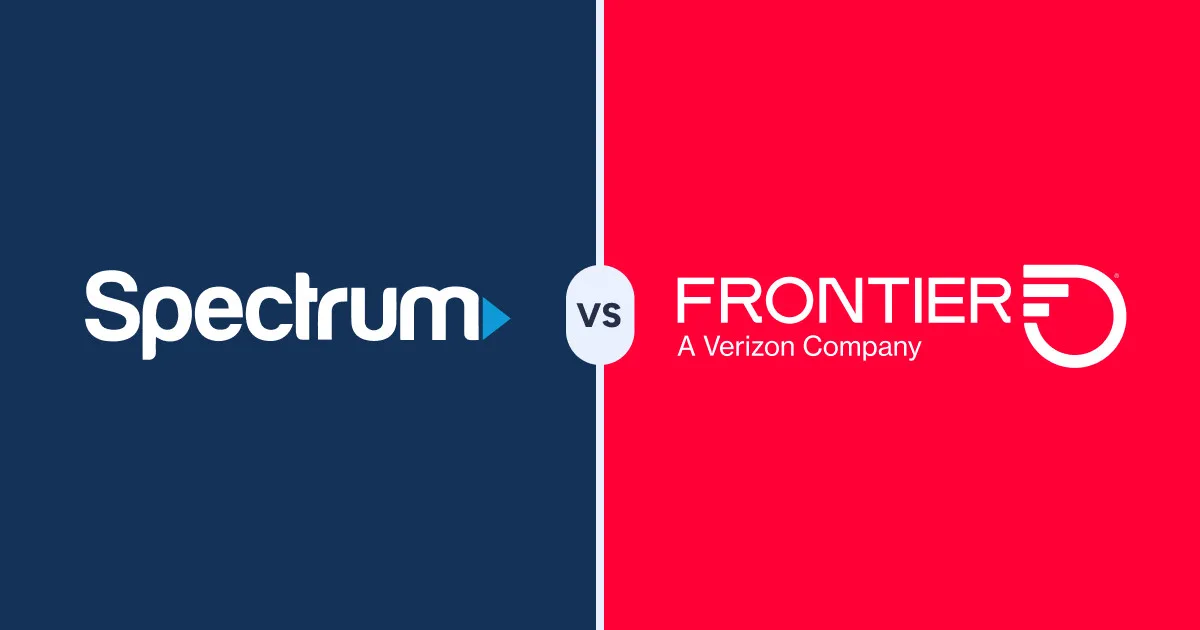AT&T Internet Air vs. Verizon: Which Internet Provider Is Best?
Both providers offer nationwide 5G home internet
Feb 12, 2026 | Share
Provider Comparisons (Versus)
-
Best for rural customers
- Customer rating: 3/5
- Price: $60/mo.*
- Speed: Up to 300Mbps
- Internet type: 5G
-
Best for fast speeds
- Customer rating: 3/5
- Price: $49.99–$109.99/mo.† w/ Auto Pay
- Speed: 300–2,300Mbps
- Internet type: Fiber, 5G
Data as of 02/12/2026. Availability and speed may vary by location, and prices are subject to change. See disclaimers.
Compare AT&T Internet Air and Verizon head-to-head
Verizon Fios is fast fiber internet, and it earns our recommendation every time. It’s fast, reliable, and the Fios 300 Mbps plan comes at a great price.
If you can’t get it, though, AT&T Air and Verizon 5G Home Internet are worthy competitors. Choose based on what’s available at your address and which 5G network is best in your area. If you don’t know, check coverage maps or ask around. Your neighbors are sure to have an opinion!
Whether you choose Fios or 5G home internet from Verizon or AT&T, you get free equipment, freedom from contracts and data limits, and sweet deals when you bundle with mobile service.
Pros and cons: AT&T Internet Air vs. Verizon
On this page:
Plans and pricing | Extra fees | Customer ratings | Bundles | Installation | Availability
On this page:
Plans and pricing: AT&T Internet Air vs. Verizon
It’s hard to go wrong with 5G home internet from either AT&T or Verizon, but Verizon Fios fiber internet is the gold standard for connectivity in 2026.
It all comes down to where you live. Only some areas of the country have access to Verizon Fios. If your home has the infrastructure for it, we recommend it. The service is so fast and reliable, we recommend starting with the cheapest plan and upgrading only if you run into problems.
If you’re not wired for fiber, you may be able to get 5G home internet. You may not have a choice between AT&T and Verizon but if you do, we’ll walk you through some plan basics so you can decide for yourself.
AT&T Internet Air plans and pricing
| Package | Starting price | Speed | Connection type |
|---|---|---|---|
| AT&T Internet Air | $60/mo.* | Up to 300Mbps | 5G fixed wireless |
Data as of 02/12/2026. Availability and speed may vary by location, and prices are subject to change. See disclaimers.
You get a solid deal from AT&T Internet Air, and the service is now available nationwide. The package costs a flat fee of $60 a month with no extra fees for installation or equipment and no need to sign an annual contract. In exchange, you get download speeds up to 300Mbps, upload speeds as fast as 30Mbps, and unlimited data.
Thanks to AT&T’s purchase of midband spectrum and improvements to its 5G standalone network, those speeds feel faster than ever. They also work better even if your nearest cell tower isn’t, well, very near. The best part? You get a 20% monthly discount if you bundle Internet Air with a qualifying AT&T mobile phone plan. That brings your total to a very reasonable $48 per month for both mobile phone and home internet. Not too shabby.
Verizon plans and pricing
| Package | Starting price | Speed | Connection type |
|---|---|---|---|
| Fios 300 Mbps | $49.99/mo.† w/ Auto Pay | 300Mbps | Fiber |
| Fios 500 Mbps | $74.99/mo.† w/ Auto Pay | 500Mbps | Fiber |
| Fios 1 Gig | $89.99/mo.† w/ Auto Pay | Up to 940Mbps | Fiber |
| Fios 2 Gig | $109.99/mo.† w/ Auto Pay | Up to 2,048Mbps | Fiber |
| 5G Home | $50/mo.† w/ Auto Pay | Up to 300Mbps | 5G fixed wireless |
| 5G Home Plus | $60/mo.† w/ Auto Pay | Up to 500Mbps | 5G fixed wireless |
| 5G Home Ultimate | $75/mo.† w/ Auto Pay | Up to 1,000Mbps | 5G fixed wireless |
Data as of 08/13/2025. Availability and speed may vary by location, and prices are subject to change. See disclaimers.
† Price per month with Auto Pay & without select 5G mobile plans. Consumer data usage is subject to the usage restrictions set forth in Verizon’s terms of service; visit: https://www.verizon.com/support/customer-agreement/ for more information about 5G Home and LTE Home Internet or https://www.verizon.com/about/terms-conditions/verizon-customer-agreement for Fios internet.
Verizon offers multiple fixed wireless and fiber plans, but what you can get depends on your address. The fiber plans provide the best value and reliability, since you’ll have fiber-optic cables laid to your house.
You’re also in pretty good shape with Verizon 5G home internet, though. Verizon has built out standalone 5G throughout its network, and that means a dedicated slice of radio spectrum just for home internet traffic. Congestion-related slowdowns may still occur, but they’re much less likely than they were even a year ago.
Shopping for speedy home internet?
Enter your zip code to find local options.

Deals and promotions: AT&T Internet Air vs. Verizon

- Get a reward card worth up to $200 when you sign up for 2-Gig or 5-Gig plan from AT&T Fiber by June 1, 2026
- Save 20% every month when you bundle unlimited wireless with home internet from AT&T
- Get up to $20 off your AT&T fiber internet plan every month for a year
- Get a 43-inch Samsung TV or a Samsung Galaxy Tab S10 when you order Verizon Fios 1 Gig or 2 Gig between Feb. 5 and April 1
- Get $15 off home internet every month when you bundle with Verizon MyPlan
- Get six months of Apple One included with a new 5G Home Ultimate Plan from Verizon when you order between Feb. 5 and April 1
Extra fees: AT&T Internet Air vs. Verizon
You don’t have to pay extra fees with either Verizon or AT&T Air, other than the standard taxes charged by your local jurisdiction. Equipment is covered in your plan price, and there are no contracts or data caps to worry about. You can even waive the $99 installation fee on Verizon Fios if you order online.
Price hikes are also rare among these providers, and Verizon even offers a sweet multi-year price guarantee depending on when you sign up.
Customer ratings: AT&T Internet Air vs. Verizon
AT&T and Verizon both got top rankings in our Annual Customer Satisfaction Survey. At the end of the day, both providers have happy customers.
5G and other fixed wireless tech types got the highest ratings for overall satisfaction, price, and customer service—beating out even fiber-optic internet, the usual belle of the ball.
Looking for reliable home internet?
Enter your zip code to shop local providers and compare prices.
Best mobile and internet bundles
| Bundle deal | How to get it | View on provider’s site |
|---|---|---|
| 20% off AT&T Internet Air | Order a qualifying AT&T mobile plan | View Plans for AT&T Internet Air |
| $15/mo. off Verizon home internet | Order a qualifying Verizon mobile plan | View Plans for Verizon Home Internet |
You can get both home internet and mobile phone service from either AT&T or Verizon, and you’ll save money on your monthly internet bill if you do. Mobile phone plans from each provider can be expensive, though, unless you have multiple lines on your account.
Installation: AT&T Internet Air vs. Verizon
| Installation options | View on provider’s site | |
|---|---|---|

| No fee for installation | View Plans for AT&T Internet Air |
|
| Free installation for 5G Home; $99 installation fee for Fios (waived when you order online) | View Plans for Verizon Home Internet |
Installation is straightforward, whether you’re ordering from Verizon or AT&T. With AT&T Internet Air, you get a self-install kit in the mail and use an app to get instructions on setting up a gateway called the All-Fi Hub. Verizon 5G Home Internet also comes with a self-install kit and easy instructions (available via app) showing you how to set it up. In both cases, you can get your internet up and running within 15 to 20 minutes.
Verizon’s Fios fiber service may be a little more complicated. If you don’t already have a fiber drop and optical network terminal (ONT) at your house, you’ll need to get a technician to come by and set that up. Aside from that, though, setup is relatively easy, mainly consisting of you setting up the gateway and choosing a Wi-Fi network name and password.
Availability: AT&T Internet Air vs. Verizon
Verizon 5G fixed wireless reaches about 25% of areas tracked by the FCC, while AT&T reaches about 15%. Whether you can sign up depends on how many other customers there are in your area, though. That’s because the services operate on excess capacity from cell towers.
Start by entering your address on each provider’s site. If you’re eligible, you’ll see a list of plans. If you don’t know what plan to pick, start by calculating how much speed your household needs and comparing prices for plans with enough bandwidth.
Looking for faster home internet?
Enter your zip code to compare local providers.
Final call: AT&T Internet Air vs. Verizon
We choose Verizon over AT&T in this contest because the service is easier to get and you have more plan choices, but you really can’t go wrong either way.
Disclaimers
* AT&T Air
Price includes $10/mo. discount when you sign up for paperless billing and AutoPay with a debit card or bank account. Or $5/mo. with a credit card.
† Verizon
Price per month without select 5G mobile plans. Consumer data usage is subject to the usage restrictions set forth in Verizon’s terms of service; visit: https://www.verizon.com/support/customer-agreement/ for more information about 5G Home and LTE Home Internet or https://www.verizon.com/about/terms-conditions/verizon-customer-agreement for Fios internet.
Author - Chili Palmer
Chili Palmer covers home tech services, with a special focus on understanding what families need and how they can stay connected on a budget. She handles internet access and affordability, breaking news, mobile services, and consumer trends. Chili’s work as a writer, reporter, and editor has appeared in publications including Telecompetitor, Utah Business, Idaho Business Review, Benton Institute for Broadband & Society, and Switchful.com.
Editor - Jessica Brooksby
Jessica loves bringing her passion for the written word and her love of tech into one space at HighSpeedInternet.com. She works with the team’s writers to revise strong, user-focused content so every reader can find the tech that works for them. Jessica has a bachelor’s degree in English from Utah Valley University and seven years of creative and editorial experience. Outside of work, she spends her time gaming, reading, painting, and buying an excessive amount of Legend of Zelda merchandise.




